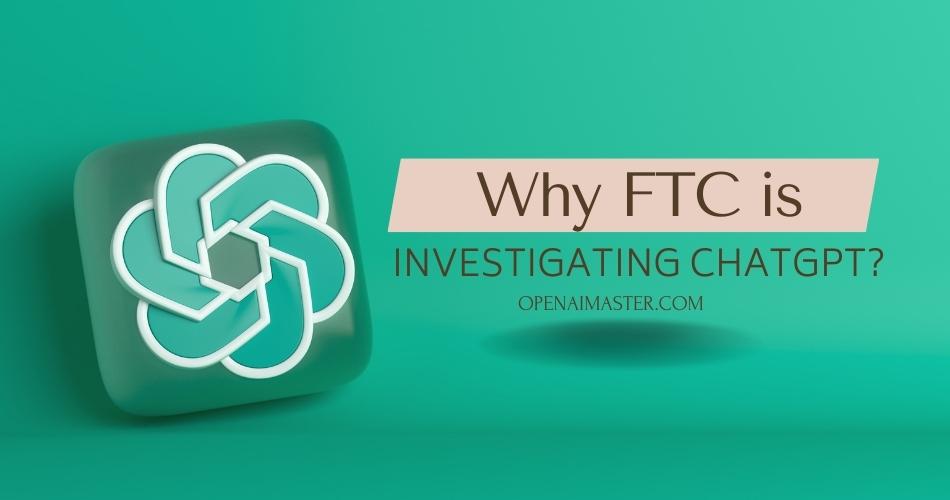OpenAI's ChatGPT Under FTC Scrutiny: A Deep Dive Into The Investigation

Table of Contents
The FTC's Concerns Regarding ChatGPT's Data Practices
The FTC's primary focus in its investigation of OpenAI's ChatGPT centers on potential violations of consumer privacy laws. The commission is examining how ChatGPT collects, uses, and protects user data, scrutinizing whether OpenAI's practices comply with existing regulations. This scrutiny is particularly relevant given ChatGPT's popularity and the vast amount of data it processes.
Specific concerns highlighted by the FTC likely include:
- Data collection and usage practices: The FTC is investigating the breadth and depth of data collected by ChatGPT, including the types of information gathered and how this information is subsequently used. This includes analyzing whether data collection is transparent and adequately explained to users.
- The potential for unauthorized data sharing: The investigation likely probes whether OpenAI shares user data with third parties without proper consent or adequate safeguards, potentially violating privacy regulations.
- Lack of transparency regarding data handling: The FTC is examining whether OpenAI provides sufficient transparency to users regarding their data handling practices. This includes whether users have clear and accessible information about how their data is collected, used, and protected.
- Compliance with COPPA (Children's Online Privacy Protection Act): Given the accessibility of ChatGPT, the FTC is likely scrutinizing OpenAI's compliance with COPPA, which sets strict rules regarding the collection and use of children's personal information online.
Several legal frameworks are applicable in this context, including the General Data Protection Regulation (GDPR) in Europe and the California Consumer Privacy Act (CCPA) in the United States. Experts in data privacy law have voiced concerns about the potential for ChatGPT to violate these regulations, citing the scale of data collected and the potential for misuse. The FTC's investigation will likely determine whether OpenAI's practices meet the standards set by these and other relevant laws.
ChatGPT's Potential for Misinformation and Harmful Content
Another key area of the FTC's investigation involves ChatGPT's potential for generating and disseminating misinformation and harmful content. The ability of large language models like ChatGPT to produce realistic-sounding text, even when factually incorrect, raises significant concerns.
The FTC's concerns likely encompass:
- The generation of false or misleading information: ChatGPT's capacity to generate convincingly false information raises concerns about its potential to spread misinformation on a wide scale.
- The potential for creating deepfakes or other harmful content: The technology could be misused to create realistic deepfakes, leading to potential reputational damage, fraud, or even physical harm.
- The lack of robust safeguards to prevent such outputs: The FTC is likely examining whether OpenAI has implemented sufficient safeguards to prevent the generation and dissemination of harmful content.
- The implications for public safety and trust: The widespread use of AI-generated content raises questions about public trust in information and the potential impact on democratic processes.
Numerous real-world examples demonstrate the potential for AI-generated misinformation to cause real-world harm. Regulating this type of content presents a significant challenge due to the speed and scale at which it can be generated and disseminated. The FTC's investigation seeks to establish guidelines and mechanisms to mitigate these risks.
OpenAI's Response to the FTC Investigation
OpenAI has publicly acknowledged the FTC's investigation and has stated its commitment to cooperating fully. While specific details of the company's internal response remain confidential, OpenAI has undertaken several measures:
OpenAI's actions to address the FTC's concerns include:
- Policy updates: OpenAI has likely updated its terms of service and privacy policies to address some of the concerns raised by the FTC.
- Technological improvements: The company may have implemented technological improvements to its algorithms aimed at reducing the generation of misinformation and harmful content.
- Public communication efforts: OpenAI has engaged in public relations efforts to address concerns and demonstrate its commitment to responsible AI development.
The Future of AI Regulation in Light of the ChatGPT Investigation
The FTC's investigation into OpenAI's ChatGPT has far-reaching implications for the future of AI regulation. The investigation highlights the need for clear guidelines and standards for the development and deployment of AI systems. This case could set a precedent for how other AI companies will be held accountable for the actions of their technologies.
Potential future regulations may include:
- Increased transparency requirements for AI systems: Future regulations will likely mandate increased transparency concerning the data used and the algorithms employed by AI systems.
- Stricter data protection laws: Existing data protection laws may be strengthened to better address the unique challenges posed by AI technologies.
- Mechanisms for accountability and redress for AI-related harm: Mechanisms for holding AI developers accountable for harm caused by their technologies will likely need to be established.
The global landscape of AI regulation is evolving rapidly, with various countries and regions developing their own frameworks. The outcome of the FTC's investigation into OpenAI's ChatGPT will undoubtedly play a significant role in shaping this evolving landscape.
Conclusion
The FTC's investigation into OpenAI's ChatGPT marks a pivotal moment for the AI industry. The concerns raised—regarding data privacy, misinformation, and the potential for harm—underscore the critical need for responsible AI development and deployment. OpenAI's response, and the eventual outcome of the investigation, will significantly shape the future of AI regulation and influence how companies develop and utilize powerful AI technologies like ChatGPT. Staying informed about this ongoing investigation and its implications is crucial for anyone interested in the future of AI and the responsible use of powerful AI chatbots like ChatGPT. Understanding the nuances of the OpenAI's ChatGPT FTC investigation is paramount for responsible AI innovation. The development and use of AI technologies such as ChatGPT demand careful consideration and proactive regulatory measures to ensure both innovation and safety.

Featured Posts
-
 I Thlipsi Toy Tzon Travolta Gia Ton Thanato Toy Tzin Xakman
Apr 24, 2025
I Thlipsi Toy Tzon Travolta Gia Ton Thanato Toy Tzin Xakman
Apr 24, 2025 -
 Is Betting On Natural Disasters Like The La Wildfires A Sign Of The Times
Apr 24, 2025
Is Betting On Natural Disasters Like The La Wildfires A Sign Of The Times
Apr 24, 2025 -
 Bold And The Beautiful Recap April 3 Liams Health Crisis Following Bill Showdown
Apr 24, 2025
Bold And The Beautiful Recap April 3 Liams Health Crisis Following Bill Showdown
Apr 24, 2025 -
 Major Crypto Spac Deal Cantor Tether And Soft Banks Potential Partnership
Apr 24, 2025
Major Crypto Spac Deal Cantor Tether And Soft Banks Potential Partnership
Apr 24, 2025 -
 Will Liam Die The Bold And The Beautiful Spoilers Reveal A Critical Health Scare
Apr 24, 2025
Will Liam Die The Bold And The Beautiful Spoilers Reveal A Critical Health Scare
Apr 24, 2025
